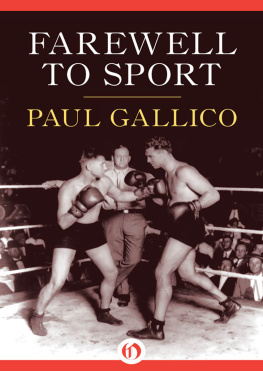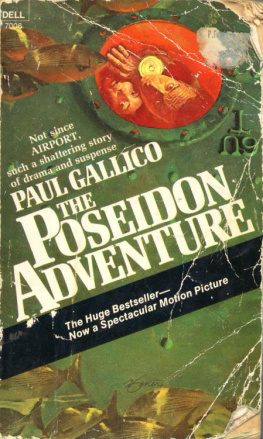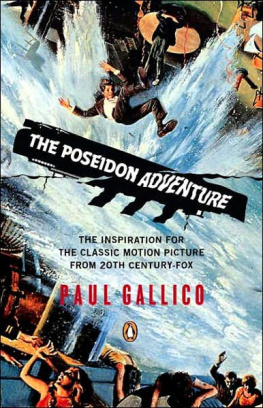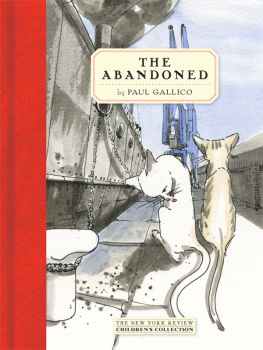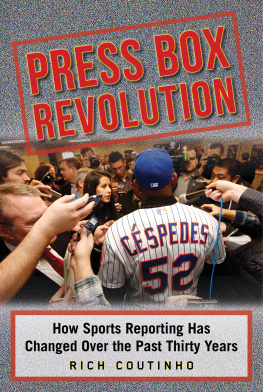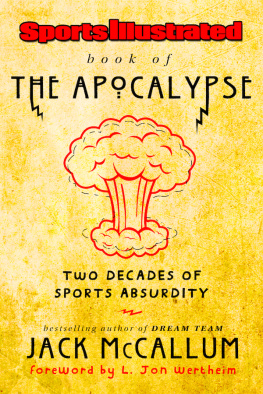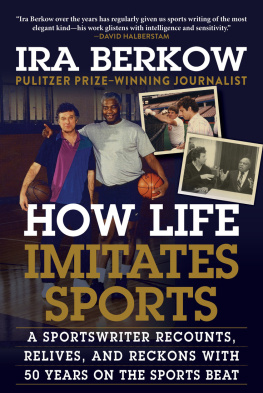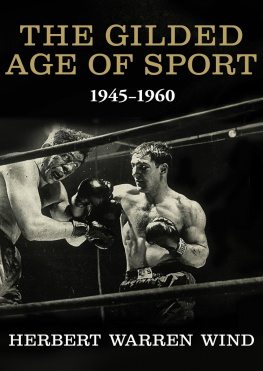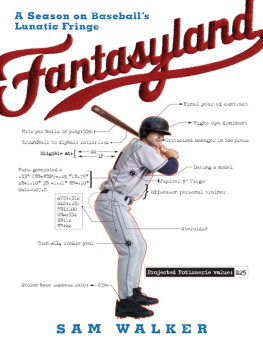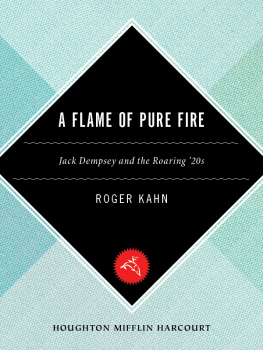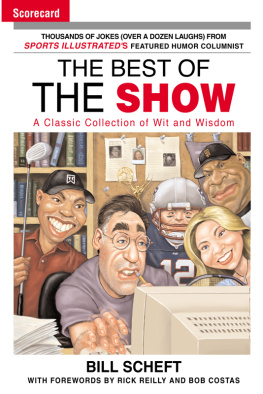Farewell to Sport
Paul Gallico

I
MINE EYES HAVE SEEN THE GLORY
From the summer day thirteen years ago when as a wide-eyed, open-mouthed novice, a rank cub who had never seen a prizefighter before, I was sent to Jack Dempseys camp at Saratoga Springs, New York, to write stories about his training for the defense of his title against the challenge of Luis Angel Firpo, to another summer evening not long past, when in the vast Reichs Sports Stadion in Berlin the Olympic flag crept down the masthead and the perpetual flame died and vanished from the great black tripod, my last assignmentthis is the first time that I have had a chance to stop for a moment and think over the things that I have seen and reported in the wildest, maddest, and most glamorous period in all the history of sport. I am able to do this, because I am saying good-by to sports-writing.
It was an incredible period, this dizzy, spinning, sports reel of athletes, events, records, personalities, drama, and speed, a geared-up, whirling, golden world in which a lifetime was lived in five years, or sometimes it seemed even overnight, as heroes and heroines, champions and challengers burst upon the scene, shone like exploding star shells, and often vanished as quickly.
I have for these past years had a ringside seat where men and women have, with their bodies, performed the greatest prodigies ever recorded. I saw the abysmal, unreasoning fury of Dempsey and Firpo fighting like animals and sat in a blinding cloudburst and watched Gene Tunney annihilate an unbeatable Dempsey. I saw Red Grange weave his twisting patterns up and down football fields, and followed in the galleries of Bob Jones as he played his smooth, superb golf shots that have never since been matched.
Bill Tilden banged his unreturnable cannon-ball service across the net, and Jim Londos stood brown and glistening with oil and sweat under the hot candelabra of the wrestling pits. Tex Rickard was a bland, thin-lipped, Stetson-hatted gambler and an organizer of prizefights on a gigantic scale, and again Tex Rickard was a painted corpse on a bier lying in a state far beyond his worth in the center of Madison Square Garden, which he built.
Babe Ruth stood up to bat on his thin, match-stick ankles, his head characteristically cocked a little to one side, slowly waving his bludgeon, and old Grover Cleveland Alexander, his oversized cap comically perched on top of his weatherbeaten head, prepared to pitch to him. Gertrude Ederle rode up Broadway standing in the back of a car with her arms outstretched with joy and happiness, into a blizzard of torn ticker tape and newspaper and telephone-book confetti. Primo Carnera, 278 pounds, fought Tommy Loughran, 183 pounds, under a Miami moon, and Giorgetti and Brocco and Spencer rode their flimsy bikes eternally around the wooden saucer of the six-day races.
What a world! What heroes and heroines! How the black ribbon streamers of the celebrating headlines poured from the high-speed presses! The death wagons roared around the Indianapolis speedway track at two hundred and twenty miles an hour, and Helen Wills was something leggy with two long brown pigtails tied with bows that bounced and shook as she ran, and then she was a grown woman, cold, calm, commanding, absolute queen of her tennis world.
Army played Navy at football before a hundred thousand people, and Paavo Nurmi dog-trotted around and around the oval running-track, in his methodical and devastating assaults upon Time, assaults that created records that no one would ever break until one day a dark-haired miler from Kansas named Cunningham ran a mile race at Princeton, not against opponents who were left far behind, but against the moving finger of a giant electric split-second clock set up at one end of the stadium. This then was to be the most dramatic foot-race ever run, and so it was until the day two summers ago when a black-shirted New Zealand medical student with straw-colored hair and a skinny body ran that same Cunningham and the greatest field of runners ever assembled into the ground in the Olympic equivalent of the mile.
Dynasties fell, nations collapsed, politics changed, dictators appeared, countries were torn apart by revolution, there were distant wars, but all I saw were the eight-oared shells glistening in the late afternoon sun at Poughkeepsie, shattering the shining surface of the water with their blades, crawling like enormous water-spiders down the reach of the Hudson; prizefighters lying twitching on the canvas while their opponents waited for them to get up, their arms following the spread of the ropes out from the ring-posts in the corners; horses streaming in gay, changing patterns around the dirt tracks, their heads bobbing in rhythm and counter-rhythm, with a million dollars and more riding on their velvet noses. In my world there were only ball games played in the hot, sweating Indian-summer days, when every move made by the figures in white and gray outlined against the brown and green diamond was greeted by nerve-shattering, hysterical roars from seventy thousand people, or there would be eight naiads in black silk swim-suits threshing the blue waters of a pool between cork-roped lanes, and lovely bodies arched from high platforms into the cool water below. Hockey-players wheeled like birds in flight on the silvery ice, armored football-players crashed their heavy bodies against one another or kicked the ball spinning up into gray sky; fencers slashed and lunged, runners threw themselves at the tightly stretched bit of string at the finish line, jumpers scissored over bars set at unbelievable heightsit was a world at play, a fantastic competitive cosmos in which nothing ever seemed more important than who won, what was the score, who did it, and how.
Moments of beauty are remembered inseparably with athletes performing in the arenas. There were Herb Pennocks pitching motion, and the gleam in the eyes of Helen Wills looking up at a tennis ball in the air during her service, and her lovely neck line, and the smooth swiveling of Dempseys shoulders as he punched a rataplan on the light bag. I find myself suddenly thinking of Maxie Hebert and Ernst Baier skating the pair at Garmisch, in a snowfall that made the scene resemble an old print, or of R. Norris Williamss backhand half-volley, or the six-round bout between Jimmy Slattery and Jack Delaney, the most brilliant and graceful prizefight ever boxed between two men.
There were Georgia Coleman poised on the springboard, her yellow hair, capless, shining in the California sun, and Dorothy Poyntons magnificent and graceful swan dive off the high tower, in which for a moment she became an exquisite white bird poised on some unseen current of air; the tremendous and awe-inspiring flotilla of vessels of every description that dotted the Atlantic Ocean off Newport, seen from the air, as they followed the America Cup races, and Aldo Nadi, the worlds greatest fencer, himself a living rapier in brilliant darting movements of attack and parry. The most perfect thing in human locomotion ever to please the eye was the foot-running of Ben Carr of Pennsylvania until one saw Jesse Owens running, not on the track, but over the top of it. Or I see Eleanor Holm Jarrett, herself a lovely creature, swimming the back-stroke, her fresh young face wreathed in green and white foam; Tommy Hitchcock leaning under the neck of his mount in full gallop to make a polo shot, Benny Howard rounding a pylon at two hundred and fifty miles an hour in Ike, one of his tiny white form-fitting racers, Pepper Martin sliding into second base.

